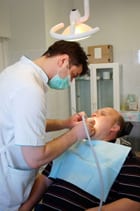Surbiton Dentist Advises Patients on Gum Disease
 Gingivits (i.e., gum disease) happens when bacteria and plaque are not properly removed with personal oral hygiene, and creates an overload that cannot be defended by the inherent defences of the body. When you visit your Surbiton dentist, they will perform a complete oral examination and take radiographs as part of your initial visit. Your gums will be evaluated by periodontal probing, and a charting of your mouth will be made. Your dentist will be looking for signs and symptoms of gum disease. Signs of gum disease are bleeding on probing, redness, swelling, visible pus, and gingival and/or periodontal pockets Gum disease may originate because of harmful bacteria and dental plaque, but can be made worse by systemic factors. Gum disease is reversible if it is treated before spreading to the underlying bone. As soon as your dentist sees any loss of your oral bone surrounding your teeth (i.e., alveolar bone), your problem will then be called “periodontal disease;” this is not reversible but can be arrested. If you do not visit your dentist on a regular basis, your gum disease and periodontal disease can go unnoticed until it is too late. Some of the results of gum disease and/or periodontitis are loosening or loss of teeth, abscesses, bad breath and spontaneously bleeding gums.
Gingivits (i.e., gum disease) happens when bacteria and plaque are not properly removed with personal oral hygiene, and creates an overload that cannot be defended by the inherent defences of the body. When you visit your Surbiton dentist, they will perform a complete oral examination and take radiographs as part of your initial visit. Your gums will be evaluated by periodontal probing, and a charting of your mouth will be made. Your dentist will be looking for signs and symptoms of gum disease. Signs of gum disease are bleeding on probing, redness, swelling, visible pus, and gingival and/or periodontal pockets Gum disease may originate because of harmful bacteria and dental plaque, but can be made worse by systemic factors. Gum disease is reversible if it is treated before spreading to the underlying bone. As soon as your dentist sees any loss of your oral bone surrounding your teeth (i.e., alveolar bone), your problem will then be called “periodontal disease;” this is not reversible but can be arrested. If you do not visit your dentist on a regular basis, your gum disease and periodontal disease can go unnoticed until it is too late. Some of the results of gum disease and/or periodontitis are loosening or loss of teeth, abscesses, bad breath and spontaneously bleeding gums.
To help prevent gum disease, you should perform proper oral hygiene regularly; twice daily brushing and flossing, and use recommended dental care products. If you gum disease progresses to periodontal disease, you may be referred to a periodontist to have this problem treated. The periodontist will perform the treatment necessary to resolve this problem, but it is up to you to maintain the health of your mouth. So, visit your Surbiton Dental Clinic for a check-up and find out if you do have the early stages of gum disease or periodontitis!





